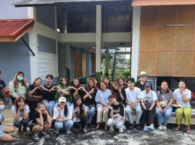St. Thomas students use their language skills to support more fruitful engagement with Latinx transit riders
Metrics
Community
Metro Transit, St. Paul, MNCommunity Size
733,098 (2018 Census Estimation)University
University of St. ThomasProgram
Sustainable Communities PartnershipYears
2017/2018Status
CompletedCase Type
Project StoriesSchool Size
Greater than 5000Focus Areas
Economic and Social InclusionDiscipline
Business, SpanishRegion
EPA Region 5, USAAccording to the 2018 census, Hispanic and Latino citizens make up 9.7% of St. Paul’s population (U.S. Census). Data from Metro Transit’s most recent ridership survey shows that over 15% of riders “speak a language other than English at home” (Who Rides?). Metro Transit aims to “improve multimodal travel options for people of all ages and abilities to connect to jobs and other opportunities, particularly for historically under-represented populations” (Page 6.4). With an emphasis on diverse and inclusive service, the organization strives to ask riders for constructive feedback.
Metro Transit first addressed the issue of language inclusivity in 2015, offering a weekly training course specifically for transit operators looking “to review vocabulary, practice pronunciation and recite basic dialogue they could use to communicate with Spanish-speaking customers” (Article). Metro Transit also sought to improve the accessibility of its customer satisfaction surveys for Spanish-speaking customers. They found that few Spanish speakers consistently responded to their surveys. This lack of data highlighted the necessity to double the efforts to better serve their customers. They started by looking to revise their survey to better engage this audience.
Susana Perez Castillejo, a professor participating in the Sustainable Communities Partnership (SCP) at the University of St. Thomas, challenged students in her Business Spanish course to improve Metro Transit’s response rates through one-on-one engagement with members of the local Spanish speaking community. Utilizing their own Spanish language skills they were learning in class, students conducted interviews with native speakers “to gather information about where and how to distribute customer satisfaction surveys, as well as to gain feedback about the… survey itself” (Abstract).
After transcribing and analyzing these interviews, students provided Metro Transit with recommendations to help increase survey response rates among native Spanish speakers. Students involved in this SCP project played a role in improving communication across language barriers and encouraging native Spanish speakers to share their thoughts on improving a service they rely on.







